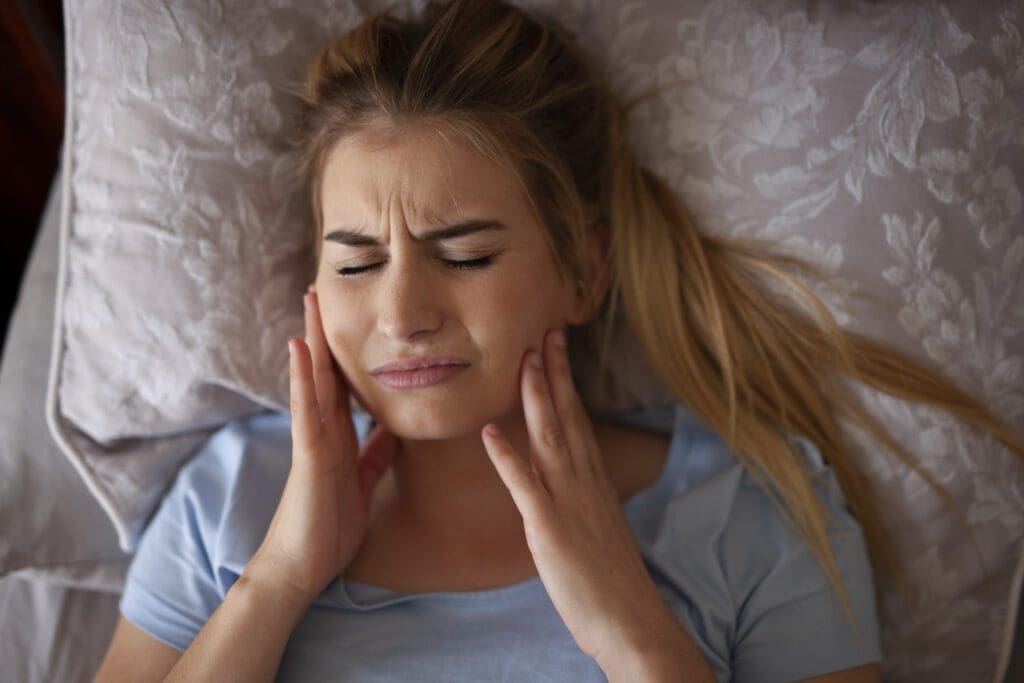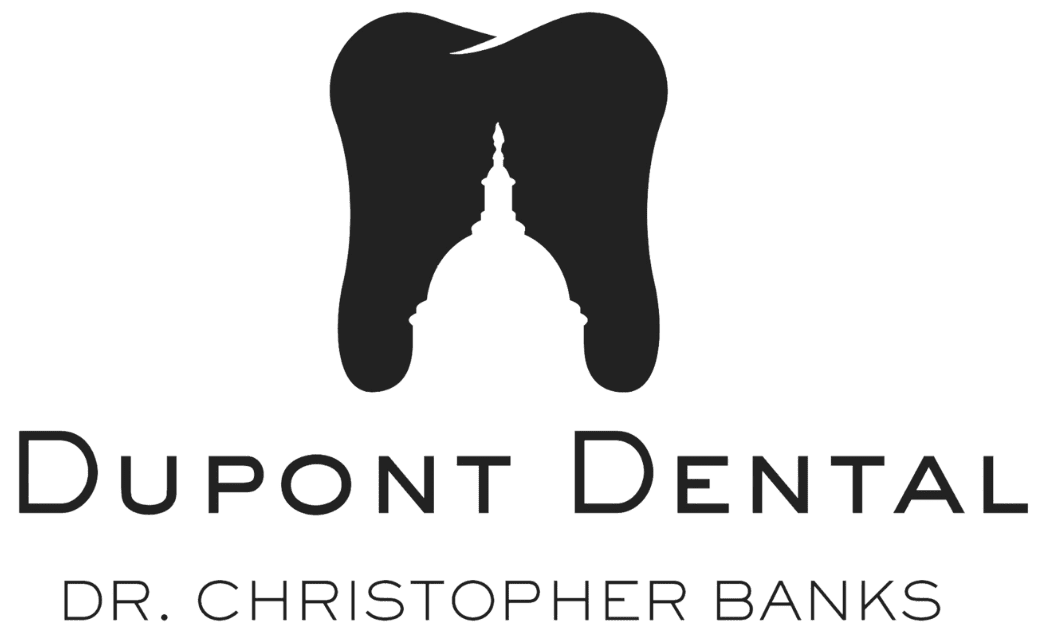Do you find yourself clenching your teeth or jaw unconsciously during the day? Do you often wake up with a headache? You could have TMD. Temporomandibular joint disorders (TMD) are bite problems that occur when there’s damage or pressure to the joints that connect the jaw bone to the skull. We provide TMJ treatment in Washington, DC.
TMJ disorders can create discomfort and pain in and around these joints. Dr. Christopher Banks offers TMJ treatment for patients at Dupont Dental in Washington, DC. Receiving TMJ treatment can restore the smile’s function and comfort. In addition to providing TMJ treatment, we provide many restorative dental treatments in Washington, DC.

Symptoms of TMJ Disorders
TMJ disorders can have many symptoms. Common tell-tale signs of TMD can include:
- Teeth clenching and grinding (bruxism)
- Morning headaches
- Pain when eating hard or crunchy foods
- Earaches
- Tooth pain
- Jaw clicking and popping
Risk factors that contribute to TMJ disorders can include:
- Arthritis
- Stress
- Crooked or worn teeth
Contact our dentist if you experience these symptoms, as TMD can worsen over time. Addressing TMD early on can prevent tooth wear, difficulty eating, lockjaw, and other everyday problems.
TMJ Treatment at Dupont Dental
Before considering TMJ treatment, Dr. Banks will perform a comprehensive exam of your teeth, gums, and jaw. He will look for signs of tooth wear, listen for jaw clicking and popping, and examine how the upper and lower teeth come together. Dr. Banks will also take digital X-rays to assess your soft and hard tissues. Based on his findings, Dr. Banks may recommend a combination of treatments for your TMJ disorder:
Night guard
Patients who experience teeth clenching and grinding during sleep benefit from custom-made night guards. Also known as a dental splint, a professional night guard is made of a hard plastic material, typically acrylic, and covers the upper or lower tooth arch.
Dr. Banks will take dental impressions to ensure the night guard and the teeth are in proper contact. Then, he sends these impressions to a dental lab, where technicians create the custom TMJ guard. After several weeks, your new TMJ night guard will be ready.
Dr. Banks will make adjustments as needed to ensure the night guard fits properly. Night guards cover the teeth to prevent bruxism and minimize tooth wear. Wearing a night guard during sleep can also reduce headaches and jaw pain.
You can care for your night guard like a mouthguard. We recommend soaking your night guard in a dissolvable cleaner after each use. Keep your night guard in its case when it is not in use.
Physical Therapy
We will recommend physical therapy for TMD patients in addition to night guards. During physical therapy, patients learn to stretch muscles in their face, jaw, arms, shoulders, and back.
Upper body exercises help reduce muscle tension and bad posture that worsens TMD. Physical therapists also provide massage to relax the facial muscles and bring back function to the joints and muscle tissues in the mouth.
Bite Equilibration
A crooked and uneven bite can worsen TMJ symptoms. In some cases, straightening teeth or creating a more even bite can reduce symptoms. We offer Invisalign aligners to treat mild orthodontic concerns like crooked teeth. However, we will not recommend Invisalign if you clench and grind your teeth. Increased bite pressure can damage the aligners.
If you have worn or damaged teeth, we may recommend treatments like dental crowns. A crown is a cap that fully covers and protects single teeth. Tooth crowns also add structure to damaged teeth to create an even bite.
How to Treat TMJ Disorders At Home
Whether you’re beginning TMJ treatment or have a sudden TMJ flare-up, you have many options to treat symptoms at home:
Eat Soft Foods
Many patients with TMD encounter jaw and tooth pain when eating hard or crunchy foods. Sticking to a soft diet for a time can alleviate stress on the jaw.
Common soft foods you can eat to reduce jaw dysfunction and discomfort include:
- Pasta
- Mashed potatoes
- Smoothies
- Soups
- Yogurt
- Soft tofu
- Bananas
- Eggs
- Oatmeal
- Boiled vegetables
You can avoid chewy or hard foods like:
- Steak
- Nuts
- Raw vegetables
- Chips
- Popcorn
Avoid taking big bites of your food, because this can lead to lock jaw or jaw pain when eating. Cut foods into small pieces when possible.
Use Heat
If you have jaw stiffness or pain, use a heating pad or warm compress on your jaw for 15 minutes at a time. Always use a towel or cloth between the heat source and your face. The heat will help relax your jaw and facial muscles.
Do Jaw Exercises
Performing jaw exercises at home can reduce jaw pain, headaches, and pain when you bite and chew. To relax your jaw, place the tip of your tongue on the roof of your mouth. Ensure your tongue is comfortably behind your front teeth. Then, gently open and close your mouth.
You can also place your thumb under your chin and gently push upward while opening your mouth. Resist the opening motion with your thumb. Hold for 5 seconds, then close your mouth.
Do not open your mouth too wide. Opening your mouth too wide when doing jaw exercises, yawning, or eating can also worsen jaw pain.
Practice Good Posture
When you hunch forward or slouch, it can strain your neck and jaw muscles. Forward head posture is common and can worsen TMD. This occurs when your head is forward in relation to your shoulders.
Exercise, yoga, and simply correcting yourself when you notice bad posture can help reduce TMJ symptoms. If you’re looking at a phone, laptop, computer, or other electronic device, ensure your screen is in your eye line. Lifting your phone higher or elevating your laptop can reduce muscle strain.
Frequently Asked Questions
We have answers to some of the most commonly asked questions concerning TMJ disorders and treatments.
How can I tell if my jaw pain is due to TMJ or another issue?
TMJ-related pain often includes symptoms like clicking or popping sounds when opening your mouth, limited jaw movement, facial soreness, headaches, or ear pain. Pain that gets worse with chewing or yawning is also common. However, tooth infections, sinus problems, or arthritis can mimic TMJ symptoms.
Does TMJ disorder cause permanent damage to the jaw?
Usually, TMJ disorder doesn’t cause permanent jaw damage if diagnosed and treated early. However, untreated or severe TMJ issues can eventually lead to chronic pain, worn-down teeth, or lasting joint damage. Prompt treatment greatly reduces the risk of long-term complications. Regular check-ups help us monitor your condition and keep your jaw healthy.
Is surgery ever necessary for TMJ disorders?
Surgery for TMJ disorders is rare. Doctors often consider it only after non-surgical treatments fail to relieve symptoms. Most patients find relief through conservative approaches like physical therapy, mouthguards, medications, or lifestyle changes. Surgery might be an option if severe joint damage or a structural problem is causing ongoing pain. We always prioritize less invasive treatments first.
What are the best foods to eat during a TMJ flare-up?
During a TMJ flare-up, stick to soft, easy-to-chew foods that won’t strain your jaw. Options like yogurt, oatmeal, scrambled eggs, smoothies, mashed potatoes, or soft pasta work well. Avoid crunchy, chewy, or hard foods like nuts, raw vegetables, or chewy meats, which can trigger more pain. Soft foods give your jaw a break and allow symptoms to calm down faster.
Does insurance typically cover TMJ treatment?
Insurance coverage for TMJ treatment varies widely depending on your specific policy and the type of treatment needed. Many dental plans partially cover conservative treatments like mouthguards or physical therapy. Surgical options might require medical insurance approval. We’ll help you review your coverage carefully and clearly explain what’s included in your plan.
Are there specific exercises to avoid if I have TMJ disorder?
If you have TMJ disorder, avoid exercises that strain or excessively stretch your jaw, like wide-mouth opening. You should also avoid aggressive chewing motions or repetitive jaw movements. High-impact sports or intense activities that cause jaw clenching can also aggravate symptoms.
Gentle jaw stretches and exercises guided by a professional can help, but avoid pushing beyond what’s comfortable. We’ll advise you clearly on safe exercises tailored to your condition.
Patient Review
Treat Your TMJ Symptoms
Do you experience frequent jaw pain and discomfort? Call Dupont Dental for treatment at (202) 946-4720. You can also schedule a dental appointment with Dr. Banks online.
Let us know if you have questions about TMJ treatment in our Washington, DC, dental office. We’re here to help.
